Humanities & Social Sciences
Mak Luminaries Call for the Promotion of Humanities & Literature in Uganda’s Education System for a Balanced Citizenry with Human & Moral Values
Published
2 years agoon
By
Jane Anyango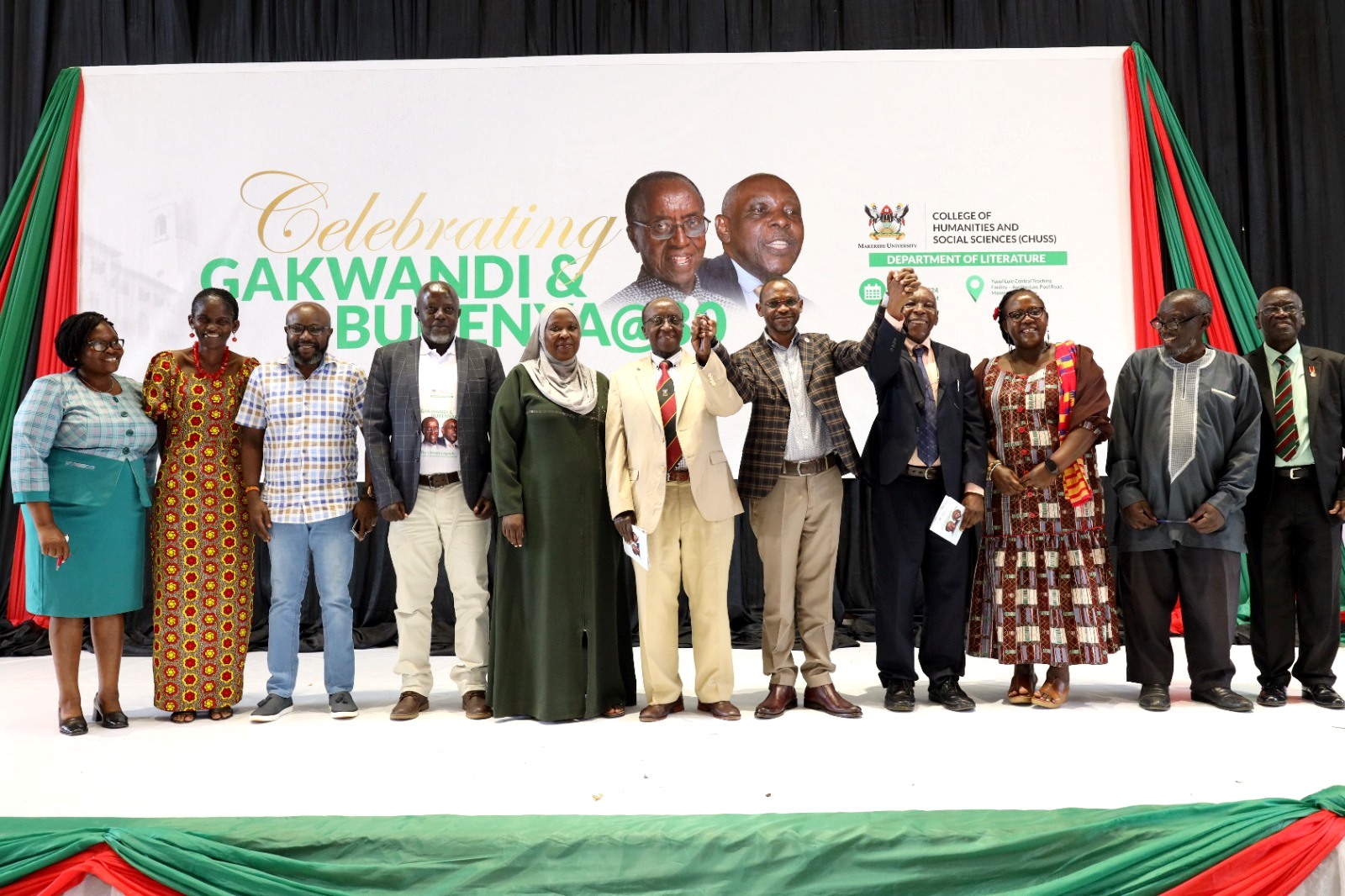
Makerere University Literary legends Prof. Arthur Gakwandi and Austin Bukenya have commended government effort in promoting Natural sciences and building the middle class economy with reservations.
Whereas promotion of natural sciences is backed by good intentions, the professors contend that downgrading humanities and social sciences will result into a population without human and moral values.
They proposed that ,for holistic human development, both natural, humanistic and social sciences must be promoted.
The two professors were speaking during their 80th Birthday on 5th April 2024 at Makerere University‘s Yusuf Lule Auditorium. The Department of Literature in collaboration with the School of Languages Literature and Communication and the College of Humanities and Social Sciences organised a half day literary event codenamed: Celebrating Literary Legends: Gakwandi and Bukenya@80 aimed at recognizing, celebrating and debating these two literary legends as part of Makerere’s literary luminaries that have contributed to her indisputable literary iconicity. Arthur Gakwandi and Austin Bukenya are seminal writers and literary scholars in Makerere University and Uganda’s history, widely celebrated beyond Uganda’s borders.
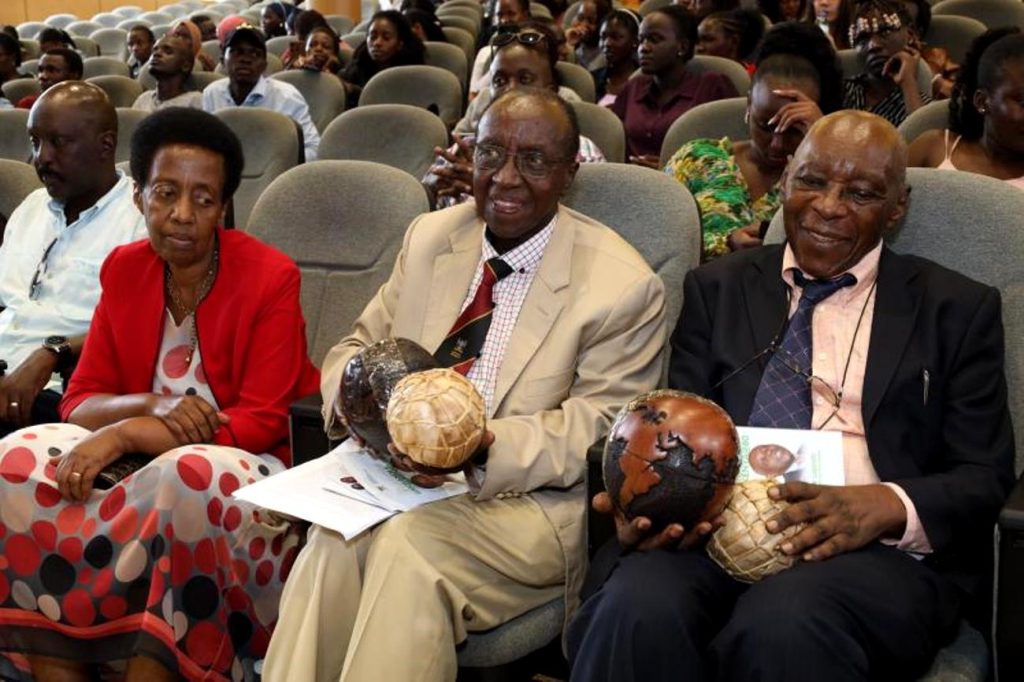
Reflecting on the Ugandan Society for the years he has lived and where the country is heading, Prof. Arthur Gakwandi noted that Government has focused and made progress in expanding the middle income class. He however noted that no one is concerned about the kind of middle class being created.
“I see people driving huge land cruisers on the highway and they lower window screens and throw bottles and banana peelings in the middle of the road. This is the middle class. I see people having a lot of money but peddling conspiracy theories, exchanging insults. Is that the kind of middle class we want? Gakwandi wondered adding that:
“So we are racing to improve the economy, introduce science by giving further incentives but Ubuntu which is the oil that creates the society, the personal relationship between people is lacking. I see people building walls around themselves and people do not know each other and only interact with money.” Gakwandi stated
Gakwandi expressed fear that the country is creating a middle class that does not serve people.
The middle class, he said is supposed to balance between the rich indulgences and lack of concern by those who are privileged on one hand, and those at the bottom who have no voice and are trapped in poverty. But if we have a middle class that does not play that role, then it’s not serving its society.
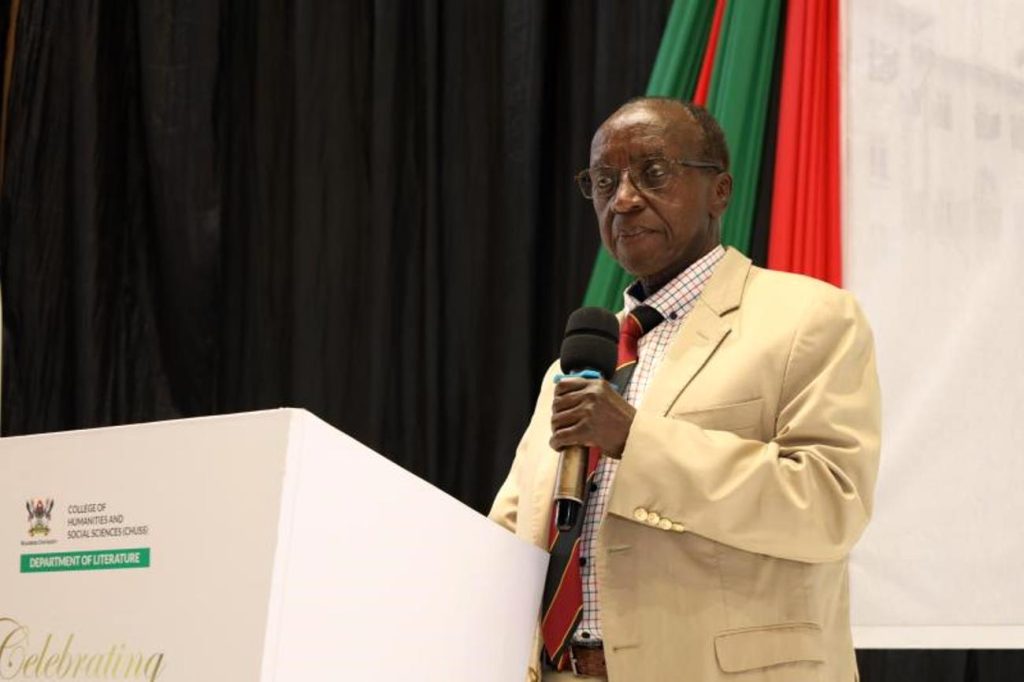
Prof. Gakwandi justified the unique power of the humanities and social sciences – Literature inclusive.
The unique power of literature according to Prof. Gakwandi is to enable readers to enter the lives of other people to experience their pain, their pleasures , their ambitions and their fantasies which, no other discipline comes close to.
“History can tell you how many people died in the 2nd world war, who were the principal actors and their roles in determining the outcomes. Even science can tell you the role of technology, the role it played in tilting the balance and economics can assess the impact of the war on economies of the countries.
But none of these can convey the personal anguish of the people who were caught up in various localities during the phases of the war, but, a novelist can capture the impact of the social and emotional life of those who were caught in the war. And when you get emotionally connected to people, you stop regarding them as statistics. So it is important to make Literature an important element of our education system and promote literature as a life-long source of leisure that has the ability to connect”, Gakwandi stressed.
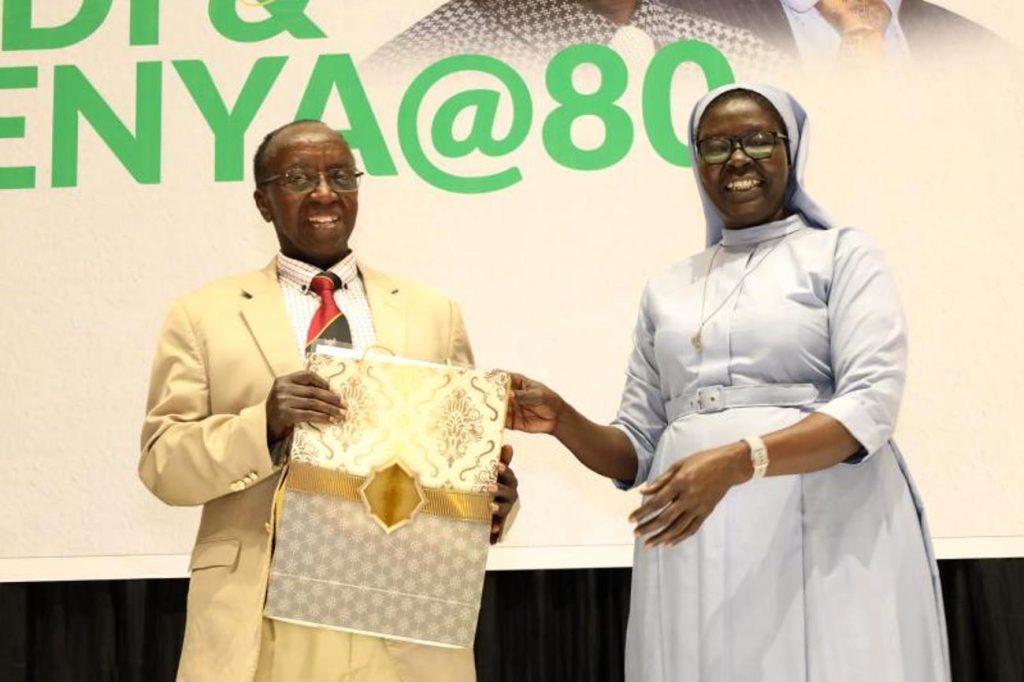
Prof Gakwandi commended the department of Literature for the recognition and courteous relationship nurtured over the years.
“What is most touching is that I keep reading the Ugandan newspapers about people fighting for office, jobs, undermining each other and trying to exclude others so as to take their positions. What has been good at the Literature department where I have spent so many years is that we had such a good courteous relationship with each other and myself, I left the department three times and every time I came back, they were happy to welcome me back. There was no rivalry, no competition…” He added
He saluted the leadership of literature department for thinking about this kind of occasion to recognise the contribution made to the growth of the department adding that he feels gratified that people that he taught have ascended to levels of professors.
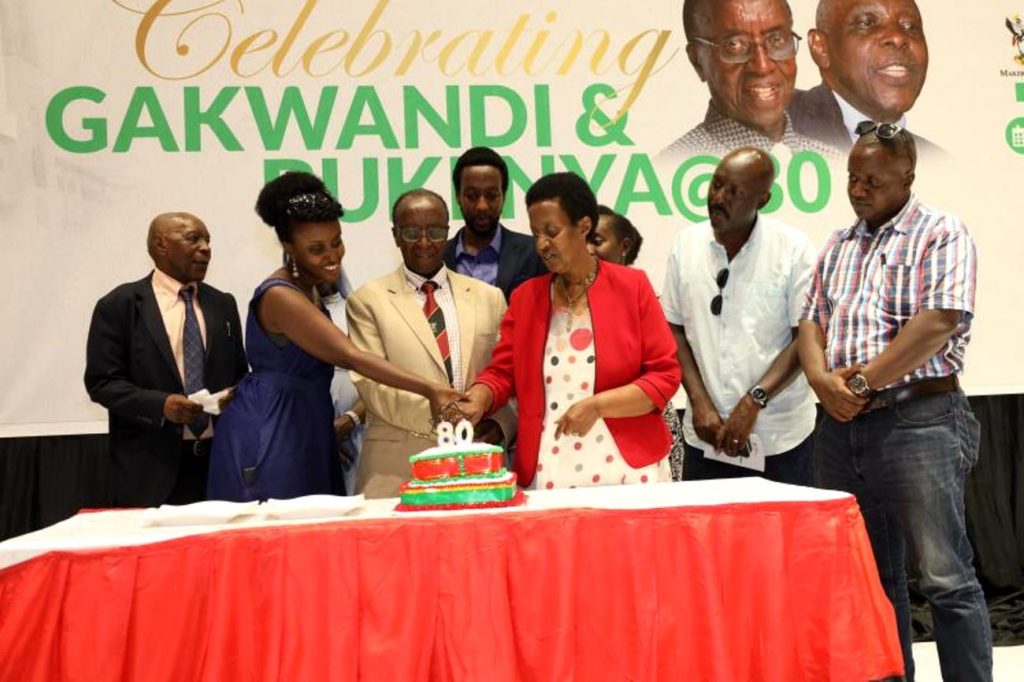
Humanities are being systematically degraded, ignored and underfunded – Prof. Austin Bukenya
Prof Austin Bukenya observed that the humanities are being systematically degraded, ignored and underfunded.
“We have to mount a certain fight to keep the humanities on the front path. We write not simply to pleasure ourselves but we write in order to sustain and develop society.
Bukenya called for respect of humanities and social sciences if the country is to produce a civilised middle class population.
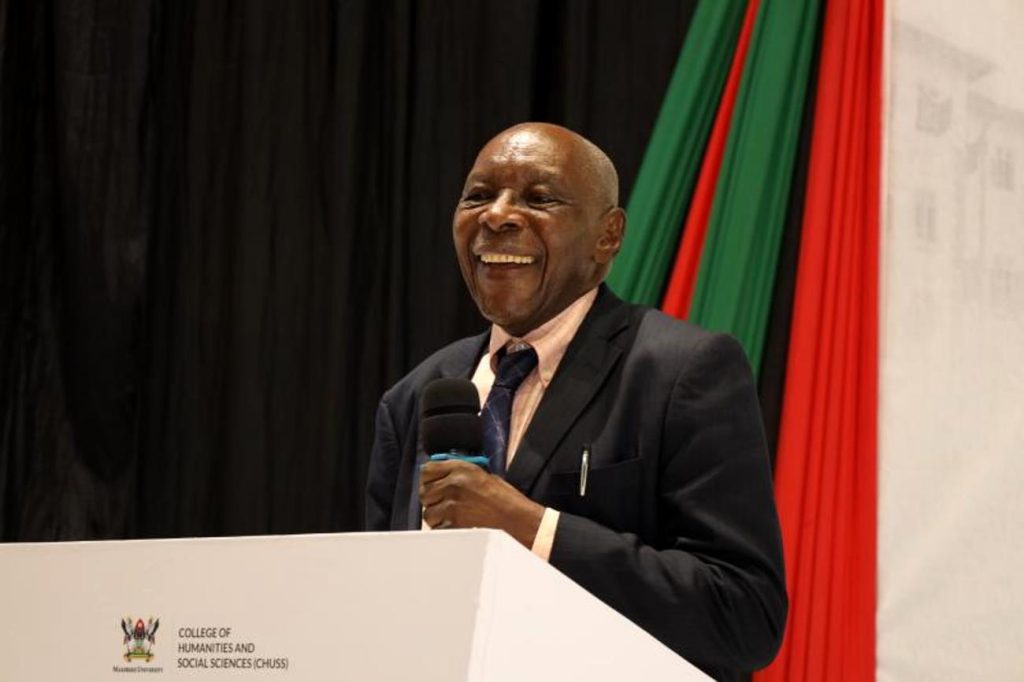
“The sciences are going to help us advance technically and economically but they are not going to help advance humanity –the Ubuntu. Please, make humanities including literature visible, desirable and acceptable.
Philosophy teaches you to think. Language teaches you how to communicate and literature teaches you how to feel and those are the processes of humanisation. We need a human society not just a country of mechanical robots”, Prof Bukenya appealed and dismissed as false the reasoning that humanities and social sciences are unemployable.
Offering guidance on how to make lives worthwhile, Prof Austin Bukenya advised participants to have passion, love and faith.
“Be driven and have passion for things that you care and feel strongly about and they will keep you going. Secondly love yourself and other people. But if you don’t love yourself, you can’t love other people and you will have low esteem. Everybody has something to contribute to your being and thirdly, have faith and believe in yourself and others especially the potential in other people to do good”, These, Bukenya said kept him going and loving his students
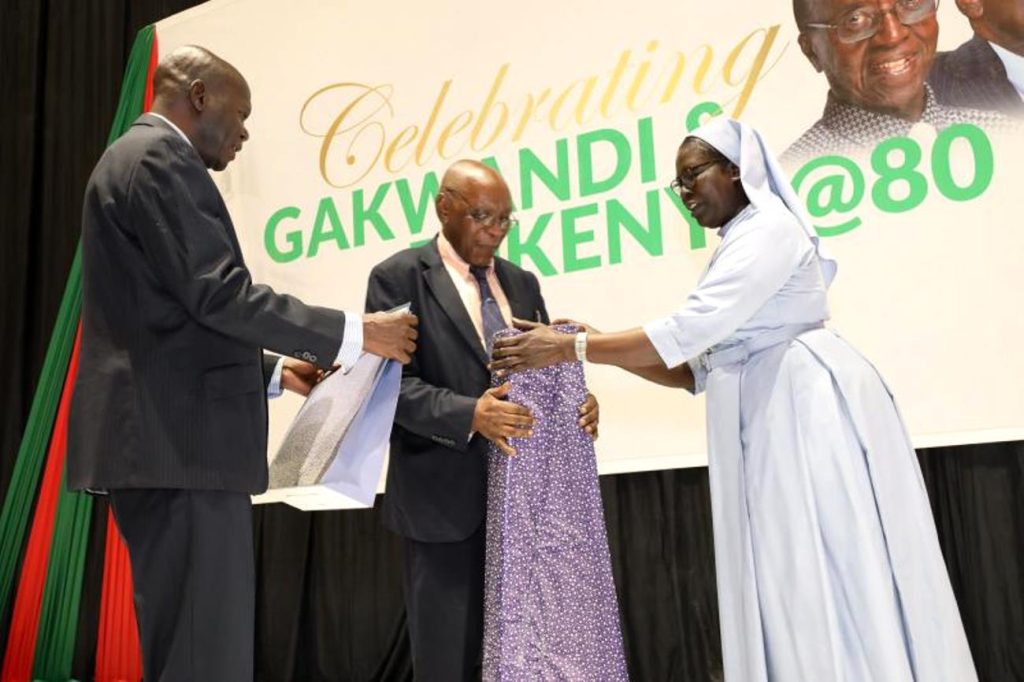
Vice Chancellor honors Gakwandi and Bukenya as unrivalled class of academics
Presiding over the function as Chief guest, the Vice Chancellor represented by his Deputy in charge of Academic Affairs Assoc. Prof. Umar Kakumba hailed the Department of Literature for making it part of their vision and aim to celebrate the people that have built for the future, describing the initiative as a great part of the ubuntu philosophy, to share the joy and achievements of those who have gone before them, and working toward inspiring the future generation.
“Their achievements outshine most of us, but also remind us that the academic journey ahead many of us is something we ought to take in order to be like they are or even greater than they are. After all, the latter generation must build on what they have found ”, Kakumba stated
He said the nature of scholarship these two gentlemen nurtured serve as a reminder of the centrality of both the literary and creative arts to human development and humanity.
“While we read stories about the characters they have created, we are reminded of our situation in the world, and how important it is to see the human being as the focus of our relationships. I am sure the students’ performances will not only entertain us, but will awaken us to the truth about our being in a world that needs healing, laughter and celebration. This is what we do in Africa when we celebrate people. This is what makes CHUSS and the Department of Literature unique”, Kakumba emphasized adding that:
“Bukenya and Gakwandi belong to a class of academics that are unrivalled. Having shared them with the world, both in academia and diplomatic service shows that Makerere truly takes its place on the world map. I have heard what they have studied and dedicated their lives to, showing that we have played in a role in building both theory and practice of the literary arts.
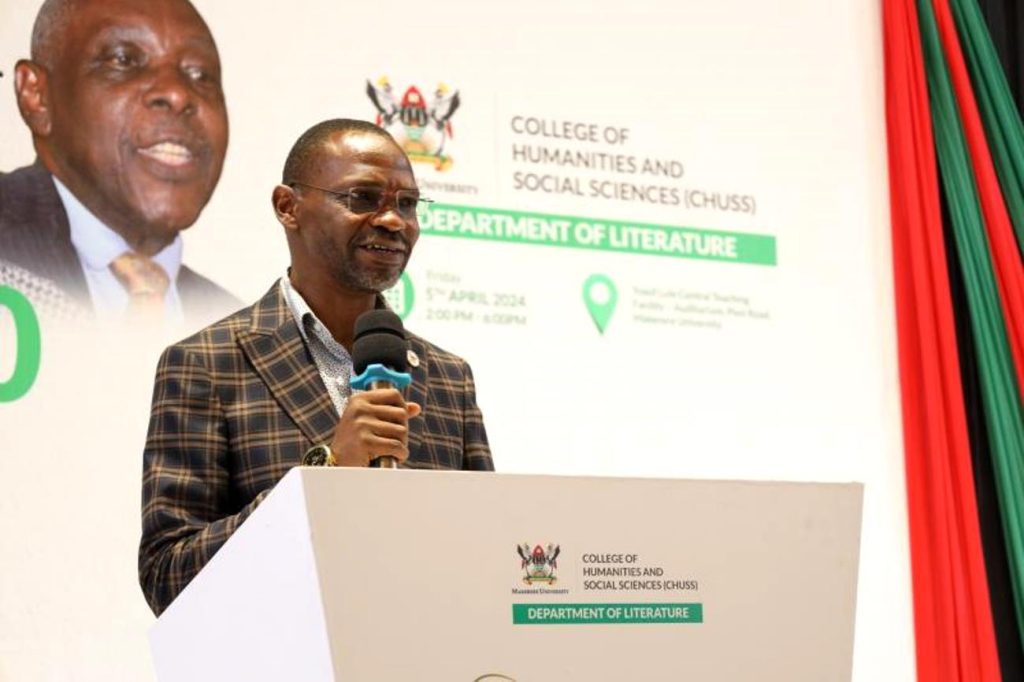
This is a journey that many of us ought to take. What they have built, we must build further and never let die. Orature is a central field of study in the Department of Literature. Seeing the man who gave it its breath seated here with us is not only awe-striking, but humbling. That is what makes the academy an amazing place”.
“Today, as we celebrate these two legends, we are reminded of our place in the twenty first century. We give due honor to the people that played a part in making the academy a place where debates and conversations about life start and keep happening. It must not end here. It is a tradition we must continue. This is what keeps our disciplines alive”, The Vice Chancellor lauded
Gakwandi and Bukenya make life real – Prof. Josephine Ahikire
The Ag. Principal College of Humanities and Social Sciences Prof. Josephine Ahikire described the day as an occasion to celebrate the practitioners of life, for this is what Literature is about.
“Literary legends like Gakwandi and Bukenya make life real or like our students say “ They make life tick”, because they talk about, reminisce, reflect, debate, analyse, comment and simultaneously live life. In short they bring life to life”. She said
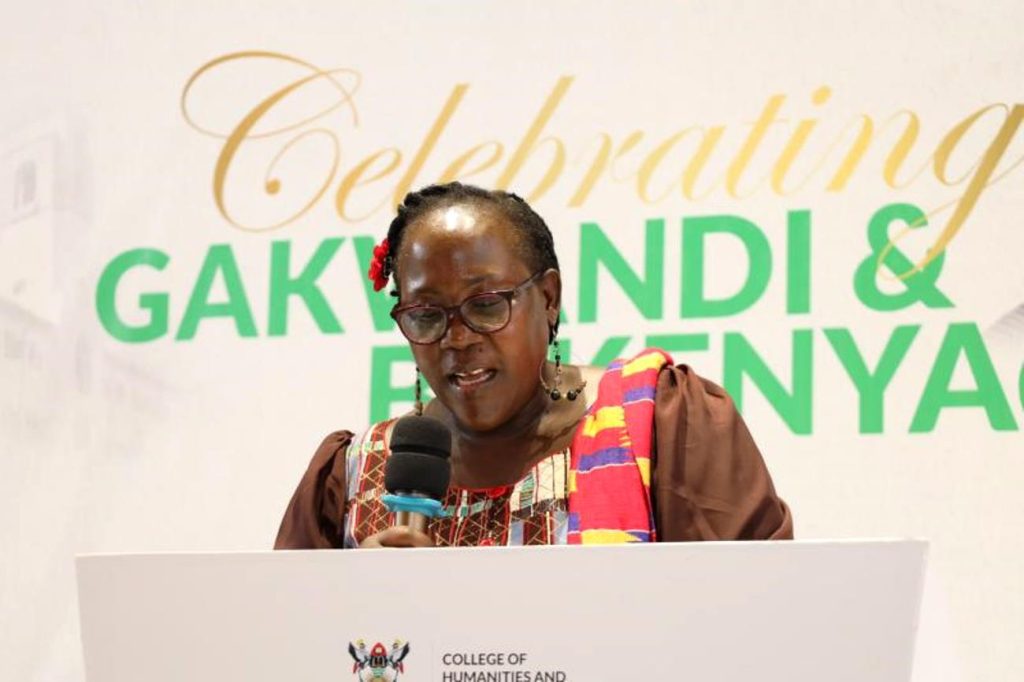
In 2022, Ahikire reported that the Department of Literature celebrated the lives of literary giants: Rubadiri, Ngugi and Wangusa but that time each icon had a separate platform. This time round in 2024, she explained, the department decided to reinvent its style and try out a double portion approach celebrating Prof Gakwandi and Prof Bukenya on the same afternoon.
“This afternoon the College of Humanities and Social Sciences is sitting at the feet of two literary legends to show strongly the great heritage we are so very proud of. Prof Gakwandi and Prof Bukenya have nurtured the Department of Literature and its sister departments through challenging times.
They carried out the work of sustaining the name of this university through the Amin years and at some point the situation was so tense that they had to leave or they would have been lost in the mist of violence. We are grateful for their resilience, prudence and for their courage as well as for always living for Makerere and Uganda even for the times when they were far away from here”, the principals appreciated.
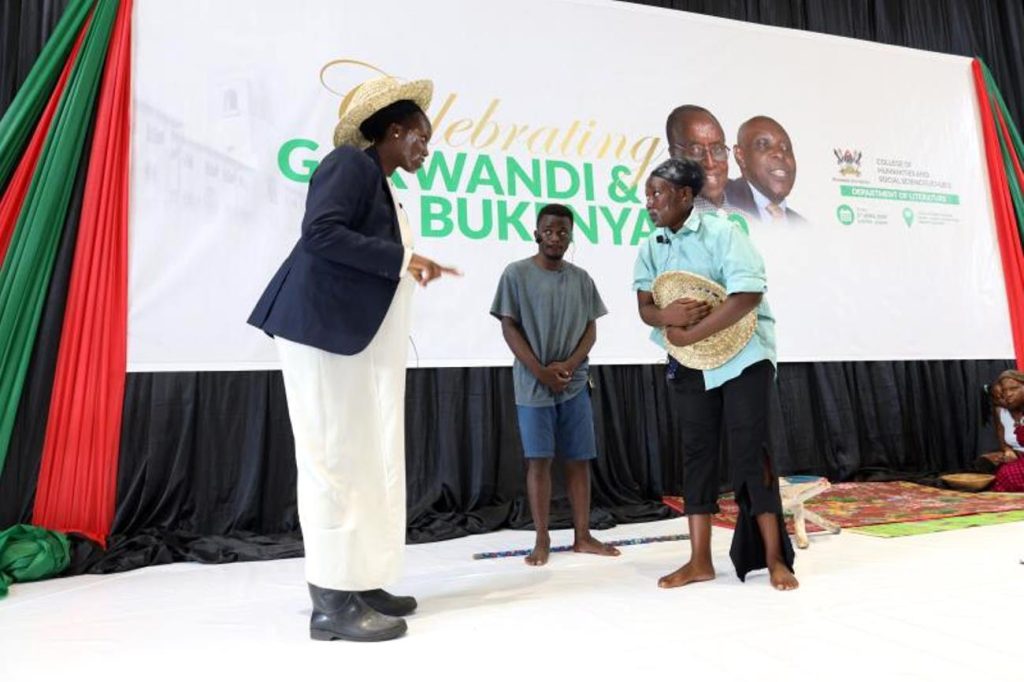
Prof. Ahikire also stated that this event put the student community at the centre of the celebration so that they understand the importance of pillars. The literary scholar Ngugi wa Thiong’o keeps insiting that all scholars that use the term orature to talk about Africa’s wealth of verbal arts should acknowledge that Pio Zirimu and his student Austin Bukenya while here at Makerere University coined the term which is being used world wide.
“We celebrate Prof Gakwandi in equal measure and acknowledge the foundational work he carried out in demonstrating how the African novel was relevant to contemporary experience and building a base for African literary criticism from the perspective of an African critic. We also take particular note of the work he has done in the field of creative writing as a mentor and a creative writer himself,” Ahikire stressed.
She was hopeful that students will look with pride and admiration to Gakwandi and Bukenya’s unique and time-tested efforts and choose to continue Makerere’s vibrant legacy of ‘building for the future’.
Prof Gakwandi and Mwalimu Bukenya are crucial pillars – Assoc. Prof. Saudah Namyalo
The Dean, School of Languages, Literature and Communication Assoc. Prof. Saudah Namyalo said, the school was proud to present two courageous voices whose academic and creative work embarks on journeys that crisscross from the real world to the imaginative and from the imaginative to the real world to teach the values of being fully human.
“As a school, we are proud to celebrate two eminent literary critics and creative writers in Makerere University and Uganda’s history. Prof Gakwandi is widely known for his novel Kosiya Kifefe and its ideas on colonial and post independence experiences and for grappling with thoughts on the transitions between the city and the village, poverty and privilege. Prof. Gakwandi both as a literary critic and creative writer has demonstrated that stories and their analysis keep us connected to our communities but also make us aware of human folly” the Dean stated.
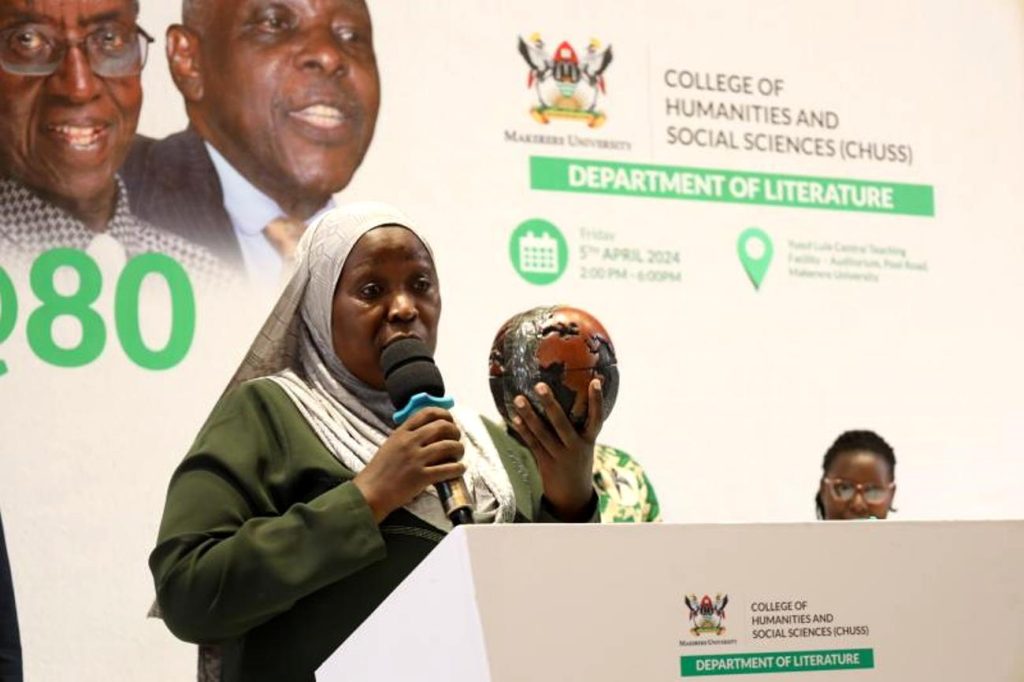
In Mwalimu Bukenya, the Dean explained that school was celebrating a man who has been hailed as a true East African, who is at home in all East Africa, and is claimed as belonging to the whole region.
“In fact sometimes our Kenyan siblings do point out that the man’s name has the word Kenya in it so he truly belongs to Kenya even by name. When he speaks Kiswahili the Tanzanians turn and tell us to send their brother back home. When Makerere Counts the years he has served here, they feel justified to say that his roots are indeed here. So the school is proud to name you, Mwalimu, among its own and to celebrate you on Makerere grounds, your first academic home”. Said Namyalo.
She thanked the Department of Literature for giving a chance to students to recognize the achievements of those before them, so that they too can be inspired to craft brave new worlds to insist that the study of humanity is valuable and priceless.
Gakwandi and Bukenya opened my academic career – Dr. Edgar Nabutanyi
The Head Department of Literature Dr. Edgar Nabutanyi thanked Prof Gakwandi and Mwalimu Bukenya for giving the university this honor to celebrate them.
Nabutanyi expressed gratitude to the Vice Chancellor for making time to celebrate with the department and for continuously heeding to the department call.
The head also thanked the Dean and Principal for untiring support to the department given the numerous activities they engage in. Nabutanyi extended appreciation to Chair organizing committee for the successful organization of the event.
Dr. Nabutanyi introduced and thanked outstanding members of staff who have won national and international awards to show the genealogy of great work that the department of Literature has produced. He said the winners stand on the shoulders of the giants like Gakwandi and Bukenya being celebrated for their great work.
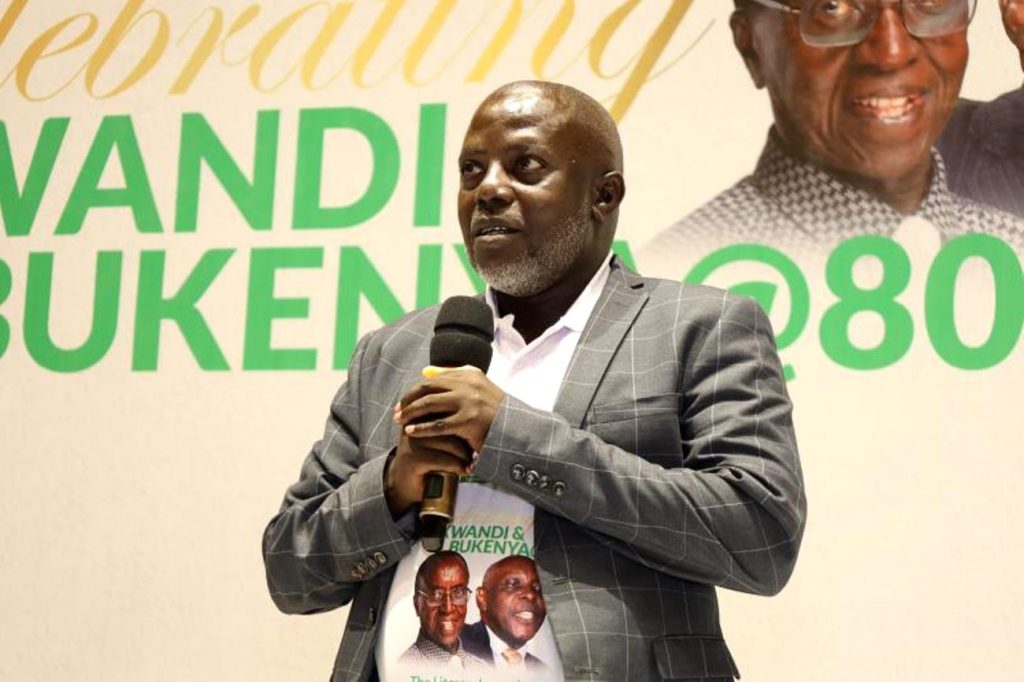
The two celebrated gentlemen according to Edgar Nabutanyi are important in his life.
“In mid 2000s I was assigned Prof. Bukenya as my supervisor for MA and during those days, I was young and thought I was clever and I had an exaggerated sense of what I could do as a dissertation. I told him I wanted to read the African Novel using the architype theory. He spent ten minutes explaining what architype were and recommended Prof. Gakwandi’s book and the novel – Contemporary experiences in Africa.
This, in a way opened my academic career and a few years later, Prof. Abasi Kiyimba during my defense of my thesis commended me for having done good work and mastered not only the theory but also the area”. He narrated
Dr. Nabutanyi continued to attribute his success to the two celebrated professors citing that during his teaching career at O-level, his student nicknamed him Kifefe in shortened form as Kife and the name is still popular with students he taught that time.
He said the two, Gakwandi and Bukenya have been influential expressing hope and pledged that the new crop of students will live to the good works that these elders have done.
He thanked Prof. Gakwandi and Bukenya for gracing the corridors of the literature department and doing the wonderful work. He also extended gratitude to their families for sharing with them.
The Chair Organising committee thanked all participants and the Gakwandi and Bukenya family for gracing the occasion.
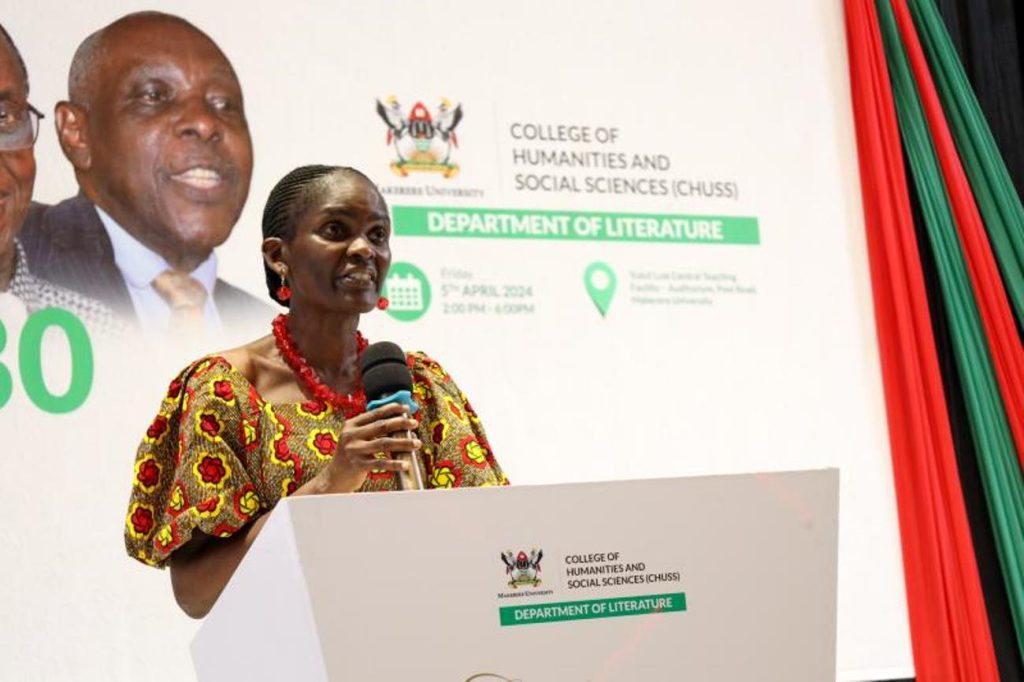
Kiguli recognized the efforts by the committee in providing the forum to promote critical debate and advance awareness of homegrown talent and outstanding service to humanity beyond Makerere’s century of existence.
Kiguli described Prof. Austin Bukenya as an orator who speaks many many languages fluently while Prof Arthur Gawandi as widely travelled and one who has met and dined with great writers.
In the spirit of continually drawing attention to our own work and accomplishments at Makerere University, the Department of Literature showcased oral performances from the students, readings, a keynote address by Prof. Abasi kiyimba and a panel discussion of Gakwandi and Bukenya Scholars.
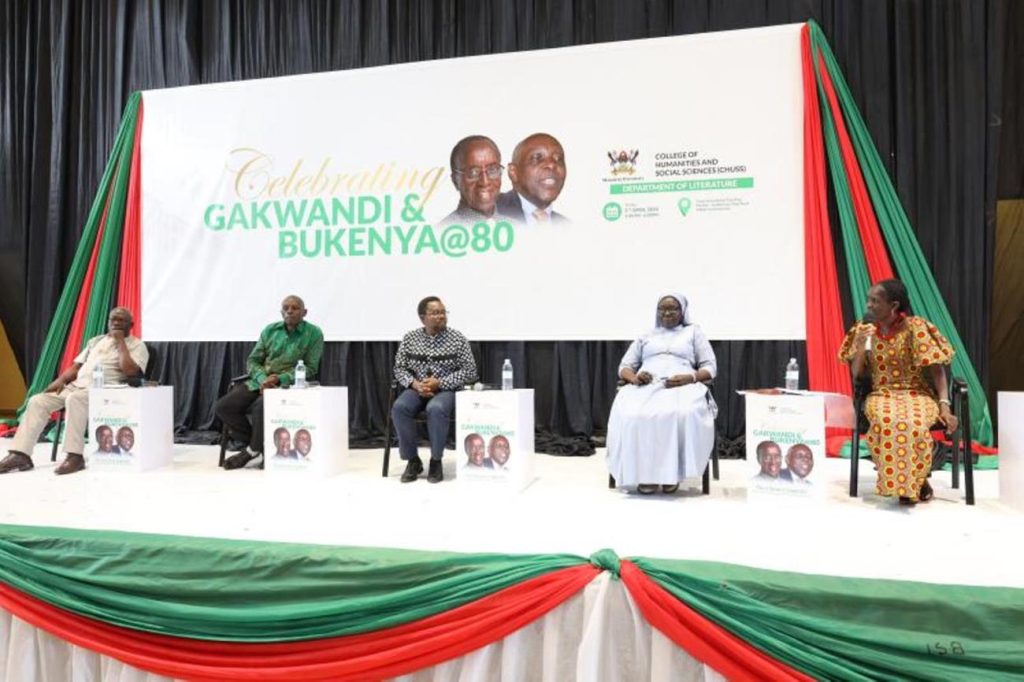
Most of the activities of the day were carried out by students from the Department of Literature in a bid to inspire them to think of the importance of following the work of our own scholars and practitioners. This effort aims at focusing on Gakwandi and Bukenya’s monumental achievements and promoting creative writing, critical debate and cultural production within Makerere University, Uganda and beyond.
The Keynote lecture by Prof. Abasi Kiyimba is downloadable below.
More readings below:
Makerere Celebrates Literary Titans: Gakwandi and Bukenya in Newvision: https://www.newvision.co.ug/category/education/makerere-celebrates-literary-titans-gakwandi-NV_185062
Mak set to honor Gakwandi and Bukenya @80:
https://chuss.mak.ac.ug/news/mak-set-celebrate-literary-legends-gakwandi-and-bukenya80-0
Gakwandi and a few rebels of Ugandan literature Wednesday, April 03, 2024: https://www.monitor.co.ug/uganda/oped/columnists/charles-onyango-obbo/gakwandi-and-a-few-rebels-of-ugandan-literature-4576498
Makerere Honors Professors Arthur And Austin For Their Contribution To Literature. Church of Uganda Family TV: https://youtu.be/oe5YW_an2vc?si=oQVnbg3v-fC4Pcdt
Makerere Professor Bukenya and Gakwandi honored. Beg TV: https://youtu.be/z-UhZ1ekgyg?si=Zgajf3dWqrnwjLM-
You may like
-


Press Statement: Makerere University Congratulates Former Staff and Students on Successful Election to Public Office
-


Mak Hosts NCHE Competence-Based Education Standards Validation Meeting
-
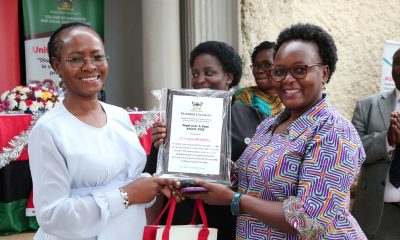

Dr. Pamela Khanakwa Honored for Steering Record 18 PhD Candidates for the Mak 2026 Graduation
-
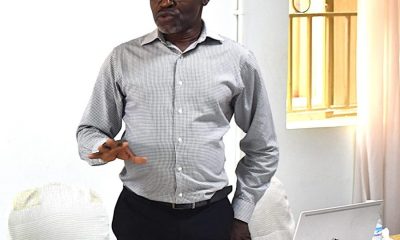

Enhancing Data Quality: NutriFishPlus Research Assistants Retooled Ahead of Baseline Survey
-
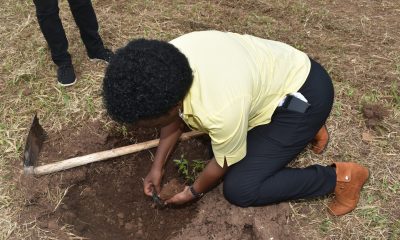

Call for Applications: QCF Postdoctoral Research Fellowships
-


Call For Applications: Annual Innovation Commercialisation Award
Humanities & Social Sciences
Dr. Pamela Khanakwa Honored for Steering Record 18 PhD Candidates for the Mak 2026 Graduation
Published
1 week agoon
January 23, 2026By
Jane Anyango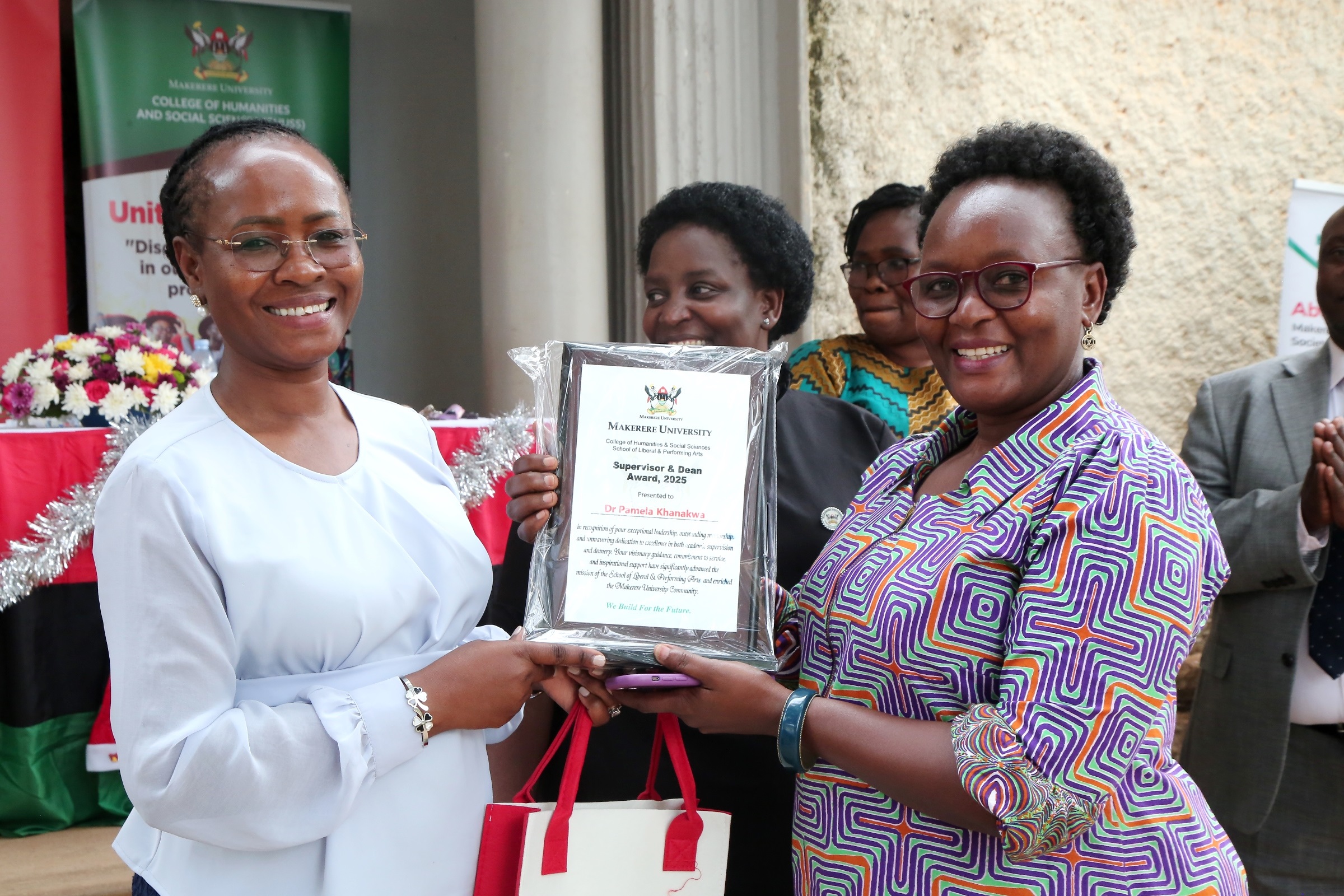
Six personally supervised, three completed in record time, as School of Liberal and Performing Arts sets a historic milestone. Dr. Pamela Khanakwa got the Award as Best PhD Supervisor and Dean
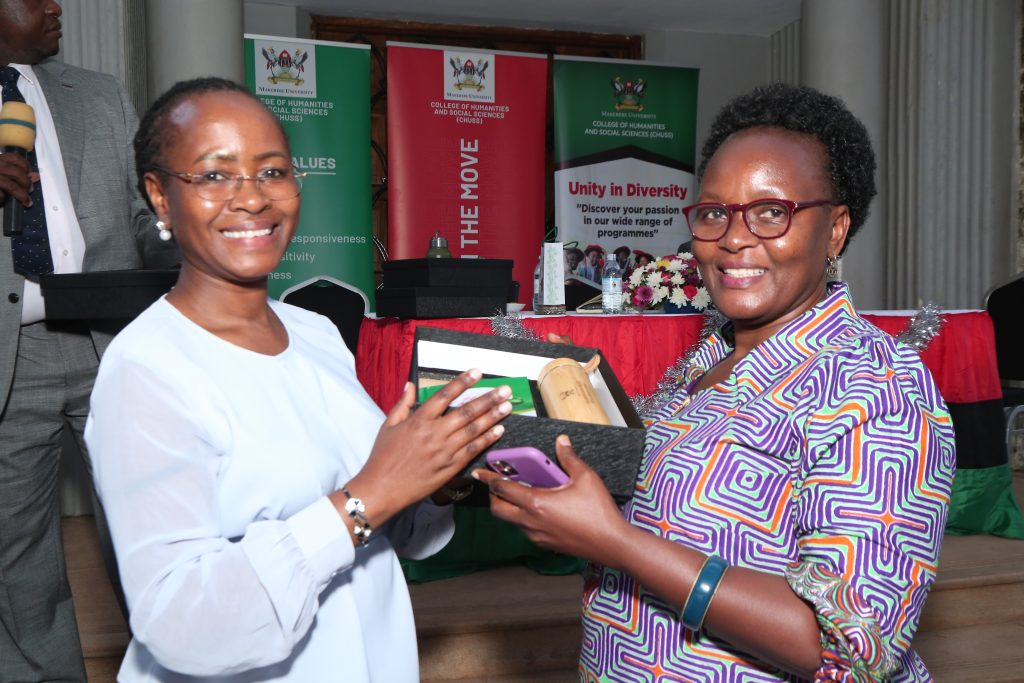
A Historic Academic Milestone for SLPA
The College of Humanities and Social Sciences (CHUSS) recognised the Dean of the School of Liberal and Performing Arts (SLPA), Dr. Pamela Khanakwa, for outstanding academic leadership that has seen the School field 18 PhD candidates for the next 2026 Makerere University Graduation Ceremony scheduled for 24th-27th February. Remarkably, six of these doctoral graduates were directly supervised by Dr. Khanakwa, with three completing within the official three-year timeframe, an exceptional achievement in graduate training. The recognition was announced during the CHUSS End-of-Year Get-Together, where staff applauded Dr. Khanakwa’s dedication, humility, and relentless commitment to postgraduate supervision and timely completion.
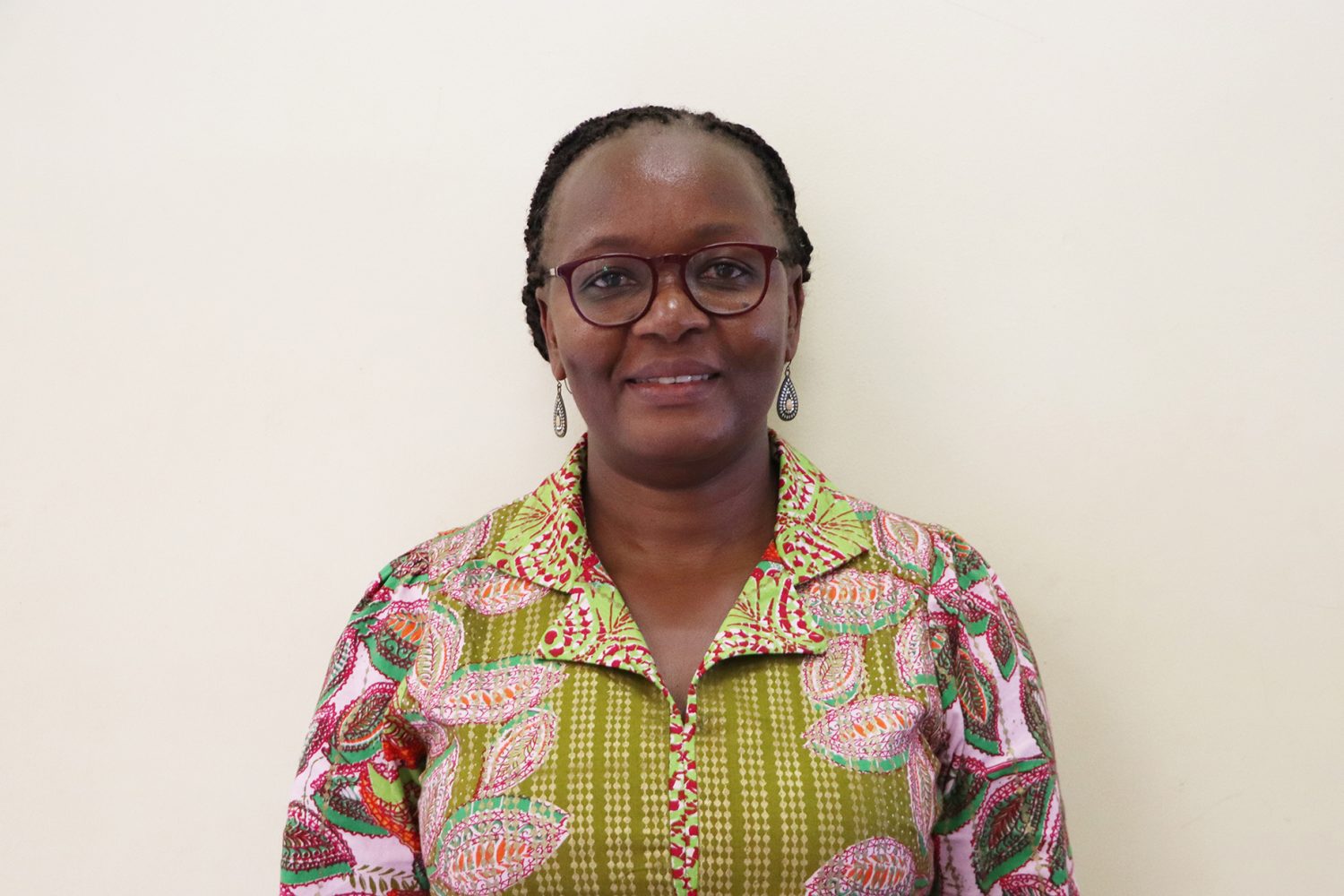
Message to Academic Staff
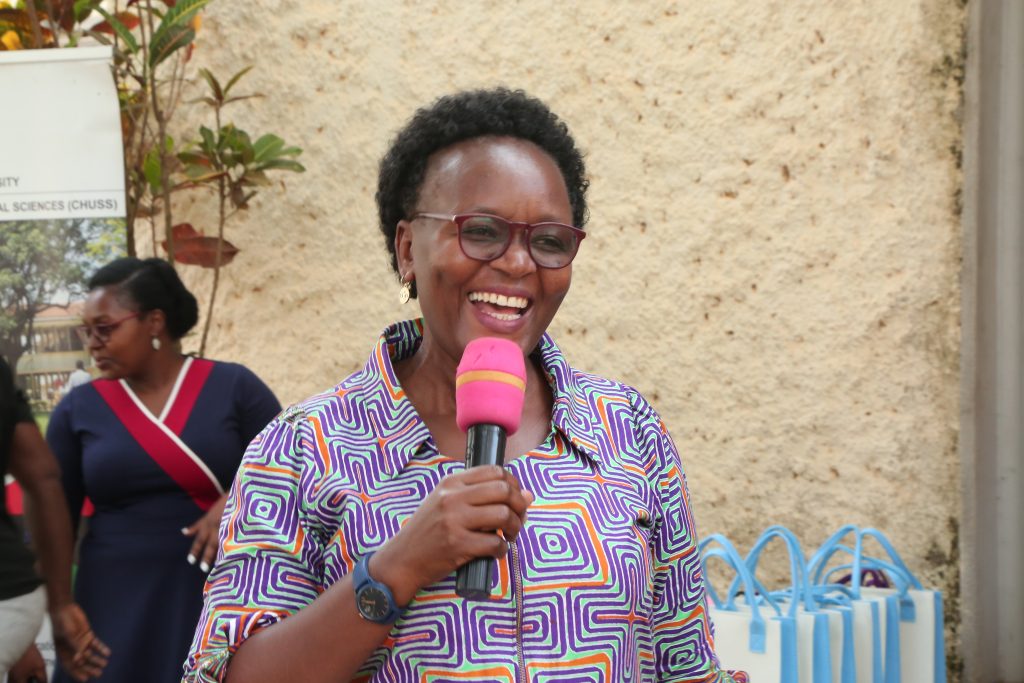
Q: What message do you have for your staff following this achievement?
Dr. Khanakwa:
First, I celebrate my staff and thank them for their dedication to supervision and student support. Academic work is demanding, and material rewards are often limited, but the true satisfaction comes from seeing students succeed.
I encourage my colleagues to remain committed. Yes, the workload is heavy, but many things are possible with dedication and teamwork. Let us continue working for the good of our students, our School, and Makerere University.
Leadership Rooted in Humility
Q: Many colleagues describe you as humble, down to earth, and hardworking. What shapes this character?
Dr. Khanakwa:
I think it is largely my upbringing. My mother was a primary school teacher from the 1950s until the mid-1980s. She worked extremely hard to raise us, combining teaching with farming to ensure we had school fees and basic needs. From her, I learned humility, discipline, and the value of hard work.
I also learned that leadership positions are temporary. You occupy them today, and tomorrow you move on. So humility is essential.
My graduate training also shaped me significantly. My PhD supervisor emphasized that graduate study is a full-time job and that results matter more than noise. Let people see your work through outcomes, not announcements.
Supervision as a Two-Way Commitment
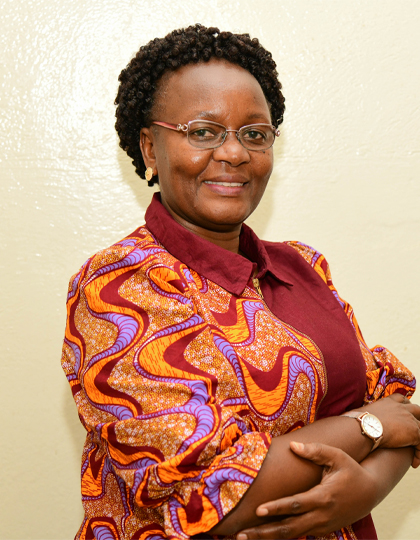
Q: How would you describe your supervision style?
Dr. Khanakwa:
I read my students’ work thoroughly, word by word. Sometimes my comments are tough, but they are honest. Supervision is a two-way commitment. I give feedback, but students must also respond and remain engaged. When that relationship works, progress happens.
Balancing Leadership, Scholarship, and Family
Q: How do you balance being a Dean, scholar, wife, mother, and daughter?
Dr. Khanakwa:
Honestly, I am not sure I balance perfectly. My mother lives far away in Bukwo, so visiting requires careful planning. My children grew up understanding the demands of academic life. I pursued my PhD in the United States and spent long periods away, but we adapted as a family.
Work has become part of my lifestyle. I use weekends to read dissertations, review manuscripts, and write. Sometimes my children ask if I ever sit without working, but this is the commitment I made. As we often say jokingly, “We humbly applied for the job, so let us do the job.”
Scholarship Beyond Supervision
Dr. Khanakwa is also an active scholar and editor. In the past year alone, she has:
- Edited scholarly volumes on archives, memory, method, and pedagogy
- Published a book with Routledge Companion
- Co-authored journal articles and book chapters with graduating students, including Priscah Asiimwe and Anatoli Lwasa Mpijja
“I feel an obligation to write with students,” she notes. “It takes time, energy, and commitment, but it is part of academic mentorship.”
Who Is Dr. Pamela Khanakwa?
Dr. Pamela Khanakwa is the Dean, School of Liberal and Performing Arts, College of Humanities and Social Sciences, Makerere University. She is a seasoned scholar, supervisor, administrator, and mentor whose leadership continues to redefine graduate training excellence. Details about Dr. Pamela Khanakwa can be accessed at: https://chuss.mak.ac.ug/en/personnel/pamela-khanakwa/
More details are available in her attached curriculum vitae.
The CHUSS End- Of-Year-Get-Together
On 12th December, 2025 the college leadership organised a get-together end of year gathering to take stock of the achievements, challenges and brainstorm together on how to move forward. The event was marked by entertainment, team building games, appreciation speeches, sharing a meal and a Christmas package for every staff
Retirees and staff recognised
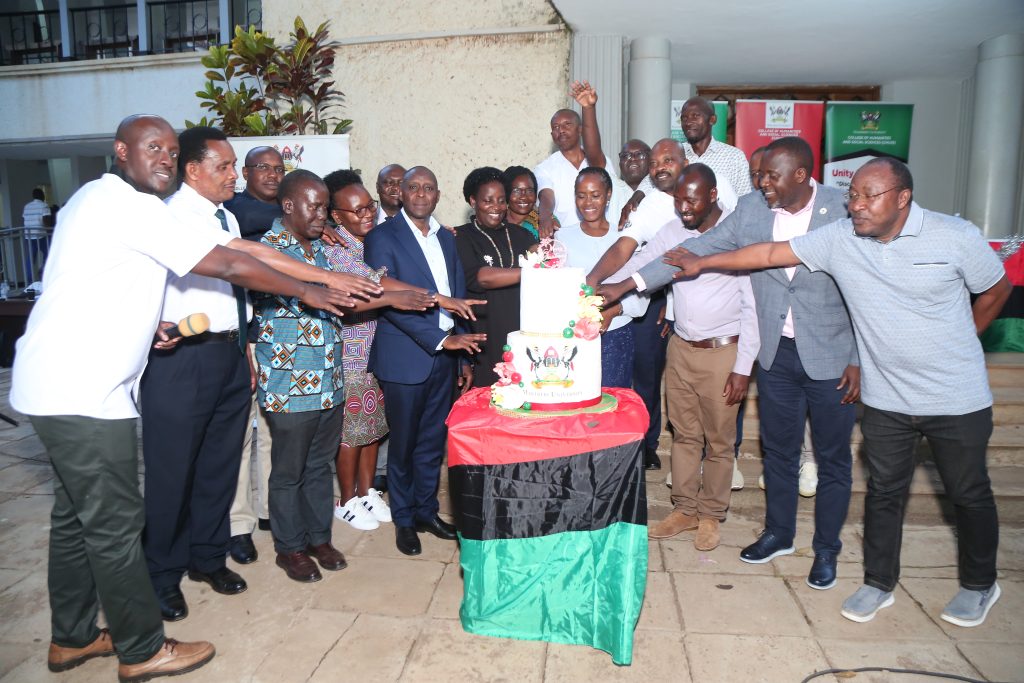
Five retired staff Dr. Micheal Wangotta Masakala, Dr. Anatole Kirigwajjo and Dr. Jackson Kizza Mukas (all from the School of Languages, Literature and Communication), Assoc. Prof. Florence Nansubuga (School of Psychology), Dr. Tusabe Gervase (School of Liberal and Perforing Arts) and Ms. Scovia Nganda Sekweyama (secretary from the School of Social Sciences) were recognised for their dedicated services to the university.
In addition to Dr. Pamela Khanakwa’s Award as Best PhD Supervisor and Dean, Ms. Birabwa Florence scooped the award of Best Registrar of the year. Birabwa is the registrar for the School of Liberal and Performing Arts.
Administrative and support staff including Ms. Mary Gyezaho and Annet Kashumbusha(both administrative secretaries in the Principals office), Farouq Lule (IT Officer), Godfrey Kakooza (cleaner), Charles Sebuguzi (driver) and Jane Anyango (Communications officer) were recognise with awards for outstanding service. Dr. Mohamed Mayanja Kajumba was from the School of Pyschology was recognised as the person with an outstanding talent in Handwriting.
The celebrations held in the Arts quadrangle were graced by the Vice Chancellor Academic Affairs Prof. Sarah Ssali and the Deputy Vice Chancellor in charge of Finance and Adminstration Prof. Ireeta Tumps.
Humanities & Social Sciences
Ugandan Journalists Trained on Peace and Gender-Sensitive Reporting Ahead of 2026 Elections
Published
3 weeks agoon
January 9, 2026By
Jane Anyango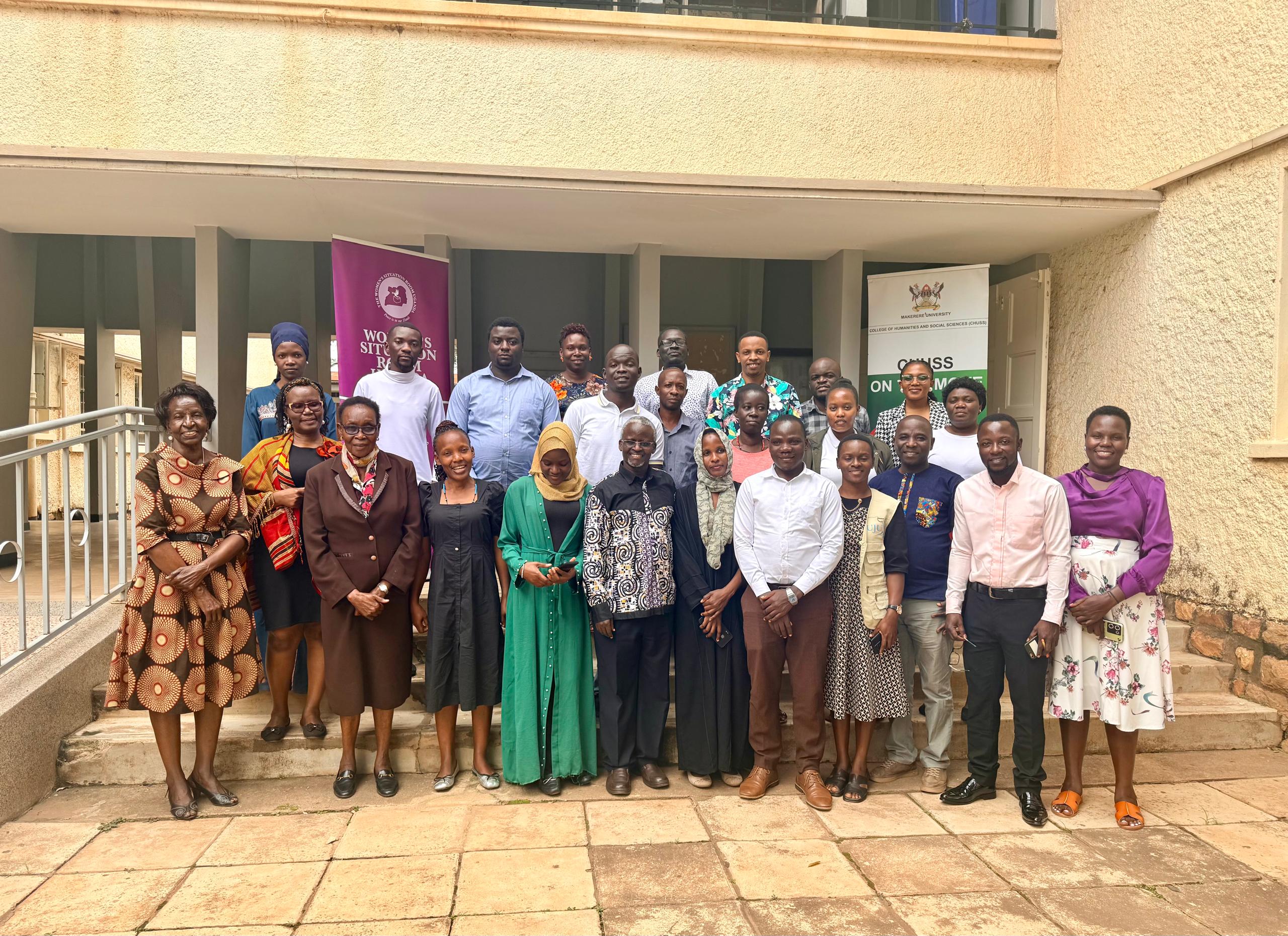
Kampala, Uganda – January 9, 2026
Ahead of the January 15 general elections, Ugandan journalists have undergone specialized training on peace and gender-sensitive reporting to ensure responsible media coverage during the election period. The two-day training, held from 8th to 9th January 2026 at Makerere University’s College of Humanities and Social Sciences Smart Room, was organized by the Women’s Situation Room (WSR) in partnership with various stakeholders and brought together journalists from across print, broadcast, and online platforms.
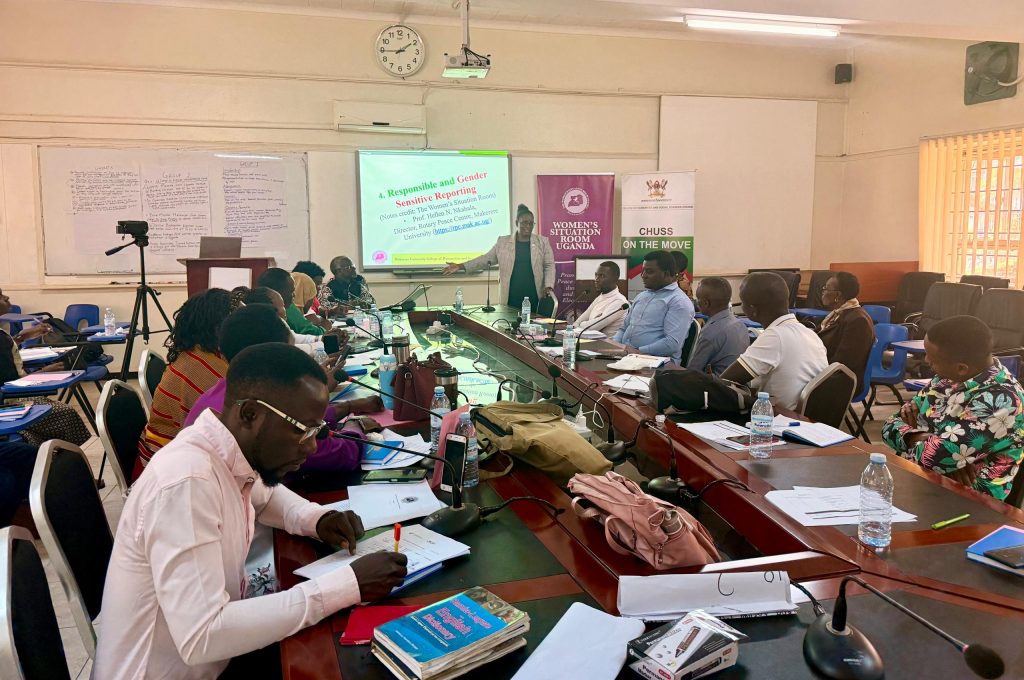
The main objective of the training was to strengthen the capacities of media in reporting and documenting electoral processes in a responsible and gender-sensitive manner. The specific objectives included: strengthening journalists’ skills to cover the 2026 elections in a fair, balanced, gender-sensitive, and non-violent partisan way; enhancing the role of media to enable citizens to be well-informed and actively participate in the election process; ensuring focused and balanced reporting on peace during and after elections; and strengthening partnerships between the WSR and media houses during the election period.
The training covered multiple critical modules. Day one focused on responsible conflict-sensitive reporting, emphasizing principles such as balance, impartiality, and accuracy. Participants explored the role of media as a relayer of the population’s voice, election monitor, catalyst for social cohesion and reconciliation, contributor to the accountability of political actors, and a platform for detecting and debunking digital media misinformation and hate speech.
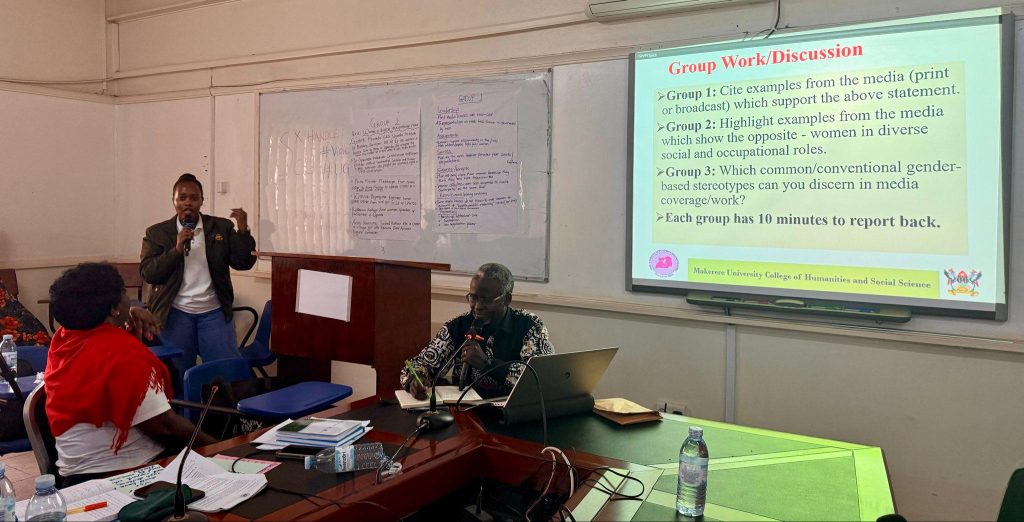
Day two addressed responsible and gender-sensitive reporting. Key aspects included the definition of gender-sensitive reporting, how to become a gender-sensitive reporter, critical elements in reporting with gender awareness, packaging gender-sensitive stories, and a checklist for detecting and avoiding gender-insensitive reporting.
Her Lordship, retired Judge Justice Mary Mayitum, emphasized the importance of peace as the foundation of development and democratic engagement. “Because we value peace more than anything. Without peace, really, you can do nothing. But where there is peace, you can have time to reflect, discuss with others, and join in meaningful dialogue,” she said. She warned that the country’s past conflicts, such as those in Gulu, underscored the necessity of maintaining national harmony.
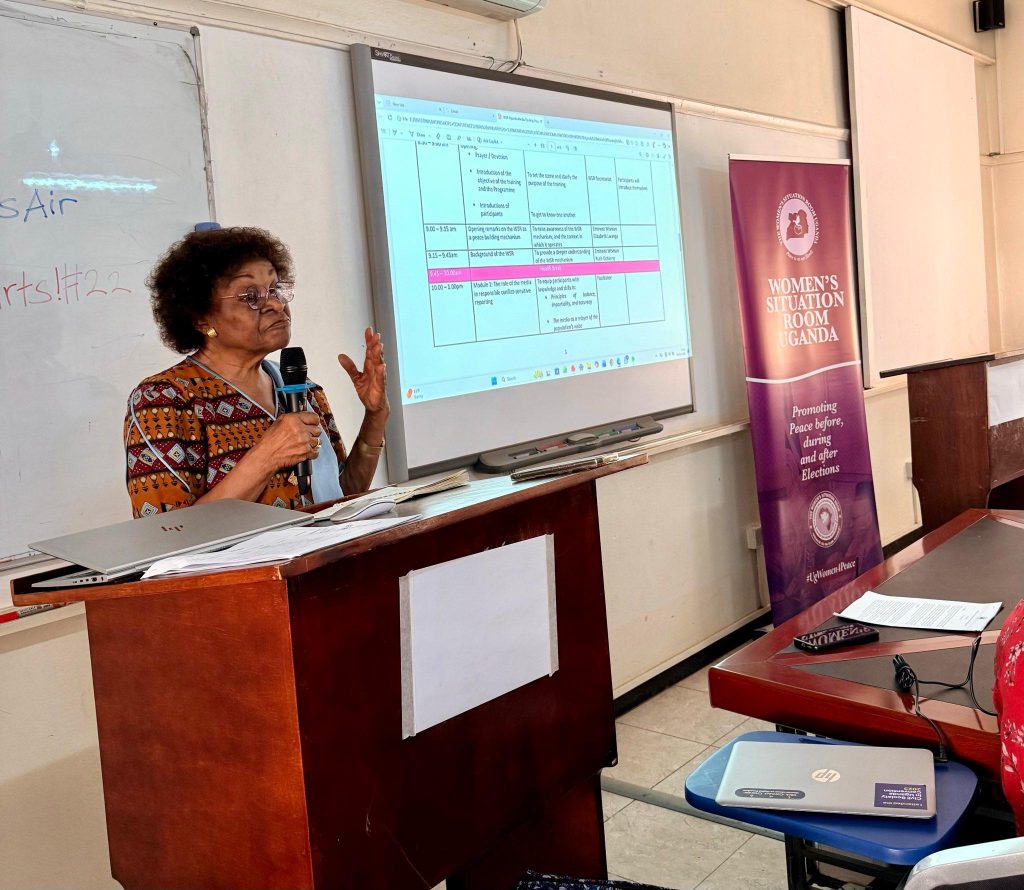
Justice Mayitum also urged other key election stakeholders to uphold peaceful conduct. “Being peaceful is the very heart of life. We have spoken to police, security personnel, political parties, and the Electoral Commission. We want politicians to have a code of conduct and to understand that it’s okay to think differently without fighting or hating one another,” she added.
Dr. William Tayebwa, lead facilitator and senior lecturer in the Department of Journalism and Communication at Makerere University, said, “This training is about conflict-sensitive reporting, peace journalism, and gender-sensitive reporting in the context of the elections. The emphasis was on giving female political candidates a voice while ensuring journalists report responsibly on election-related matters.”
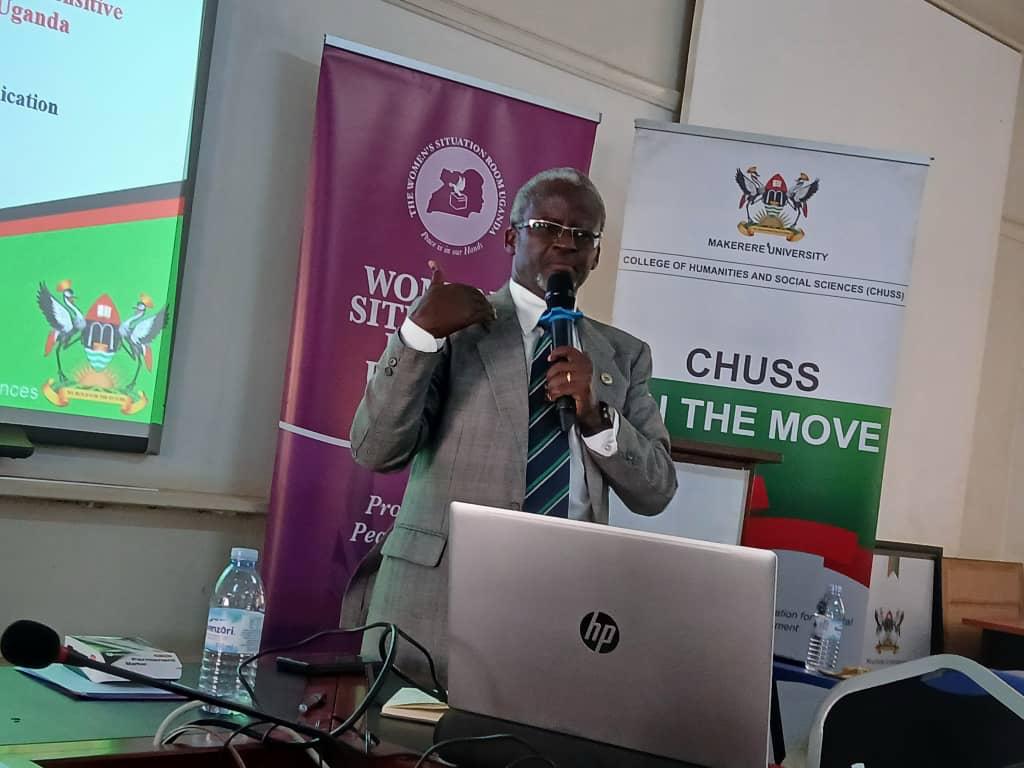
Participants described the training as timely and impactful. Tony Banizengabo of CBS Wakiso District said, “We’ve benefited a lot. We’ve been trained to write stories which bring peace, not conflict. Ahead of the elections, we are very ready to be part of peacemakers.”
Dorcas Kimono of UBC TV Kampala added, “It was so timely and rich. We learned how to report without promoting or fueling violence, giving voice to victims without angering them or encouraging violators. This is very vital, especially as we approach the 2026 elections.”
The training aims to equip media personnel with the knowledge and skills to uphold professional ethics while contributing to a peaceful, inclusive, and gender-sensitive electoral process.
Humanities & Social Sciences
CHUSS Invests Over UGX 100 Million in Interactive Smart Screens, Upgrades Teaching Infrastructure
Published
3 weeks agoon
January 9, 2026By
Jane Anyango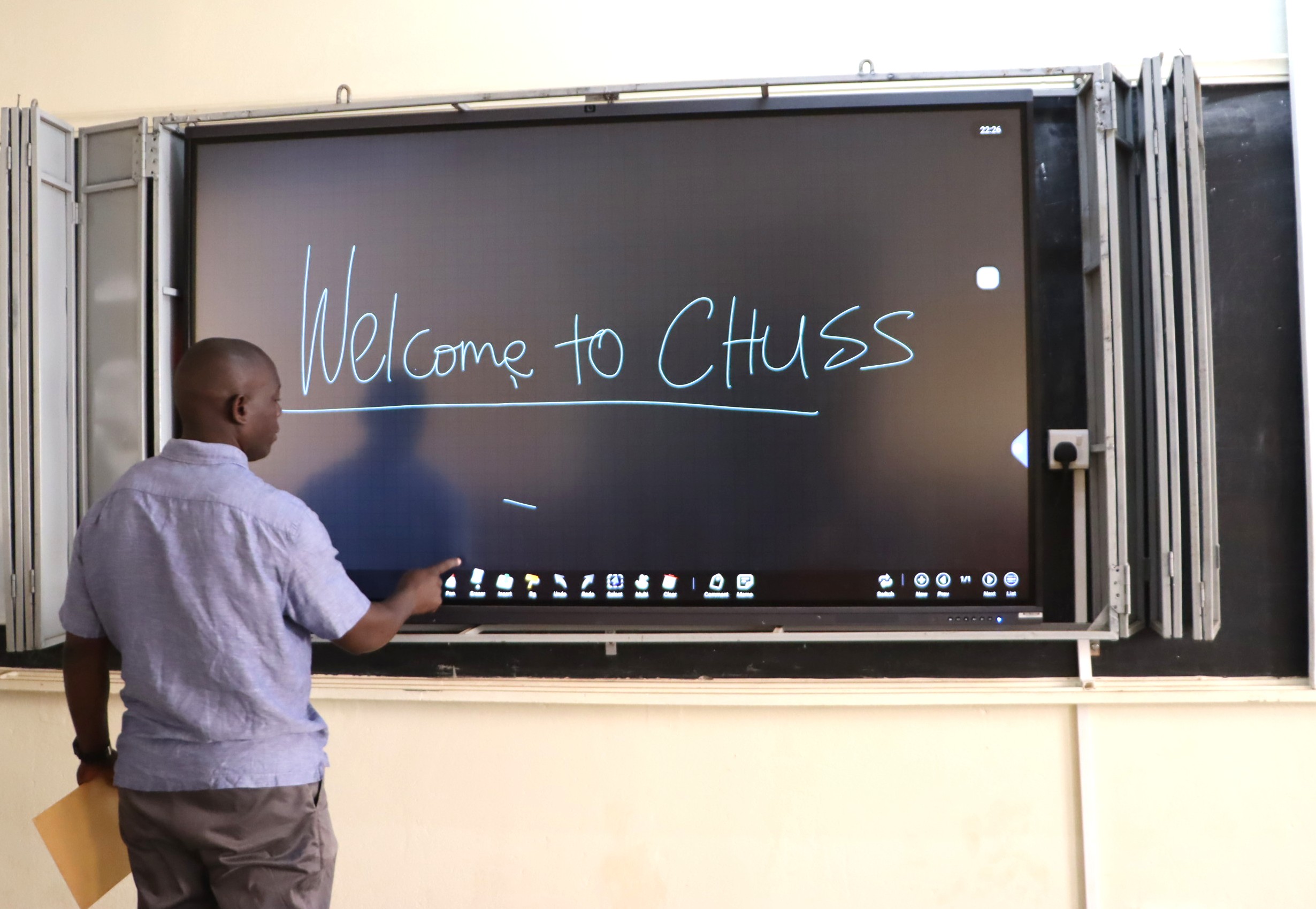
The College of Humanities and Social Sciences (CHUSS) has invested over UGX 100 million in the acquisition and installation of state-of-the-art interactive smart screens, marking a major step in strengthening digital teaching and learning at Makerere University.
Under the investment, 86-inch interactive 4K smart screens have been installed in major lecture rooms across the college’s schools, replacing traditional projectors and whiteboards. The upgrade is intended to modernise instructional delivery, enhance student engagement, and support blended and hybrid learning models.
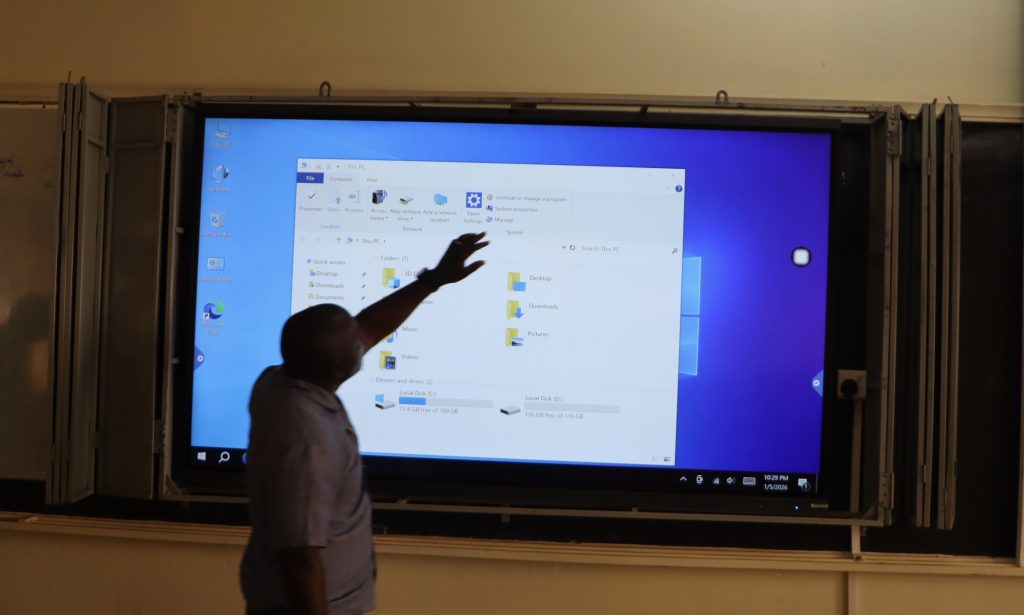
The touch-sensitive smart screens enable lecturers to write, draw, and annotate content directly on the display, while simultaneously integrating multimedia resources such as videos, presentations, and online materials. The screens support wireless screen casting from laptops, tablets, and smartphones, allowing for smooth, cable-free presentations and real-time sharing of students’ work during lectures and group discussions.
Designed to promote interactive and learner-centred pedagogy, the smart screens feature multi-touch capability that allows several users to interact with the board at the same time. This functionality supports collaborative learning, problem-solving exercises, and group presentations, making lessons more engaging and inclusive for students with diverse learning styles.
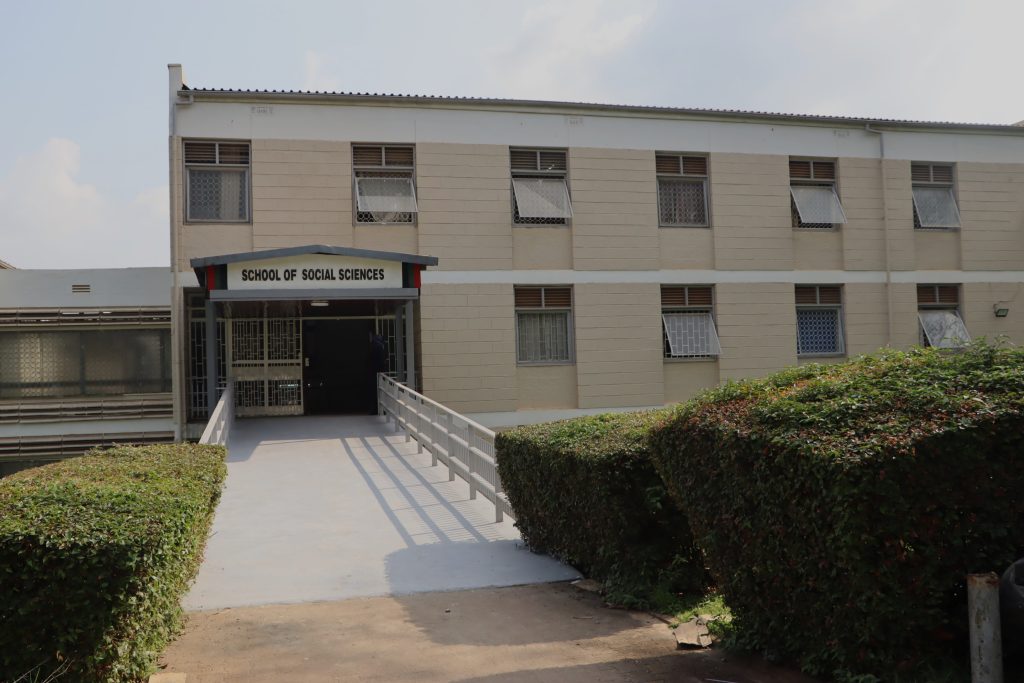
The boards are equipped with built-in cameras, microphones, and speakers, enabling seamless hybrid teaching through platforms such as Zoom, Microsoft Teams, and Google Meet. This allows lecturers to conduct virtual and physical classes simultaneously, record full lectures, and share them with students for later review, revision, or catch-up purposes.
Running on dual Android and Windows operating systems with full internet connectivity, the smart screens provide direct access to online academic resources, digital libraries, and learning management systems. Their AI-powered features further enhance lesson organisation, content clarity, and efficient, paper-free instruction, contributing to a more sustainable learning environment.
To ensure safety and prevent misuse, the smart screens are secured in fabricated metallic safety boxes installed in the lecture rooms.
Beyond digital infrastructure, CHUSS has also undertaken additional physical improvements. The Russian Lecture Room in the School of Languages, Literature and Communication has been furnished with new chairs, tables, and a projector screen, significantly enhancing its teaching environment.
The college has further improved staff working spaces, with the School of Psychology renovating office space and classrooms in Block A, while similar renovations have been carried out in the School of Social Sciences.
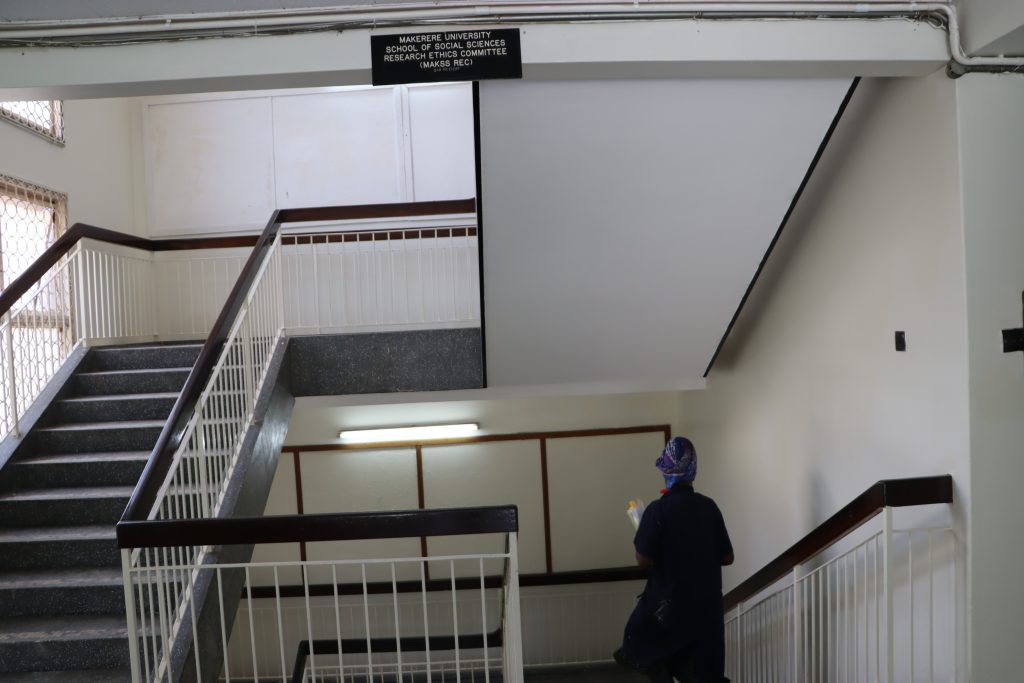
The infrastructural upgrades underscore CHUSS’ commitment to improving the quality of teaching, learning, and staff working conditions in line with Makerere University’s digital transformation agenda.
Trending
-

 General2 weeks ago
General2 weeks agoPress Release: Semester II Set to Start 10th Feb, 76th Graduation Dates Confirmed
-

 General4 days ago
General4 days agoPress Statement: Makerere University Congratulates Former Staff and Students on Successful Election to Public Office
-

 Innovation2 weeks ago
Innovation2 weeks agoCall For Applications: Annual Innovation Commercialisation Award
-

 General3 days ago
General3 days agoPress Statement: Makerere 76th Graduation Ceremony
-
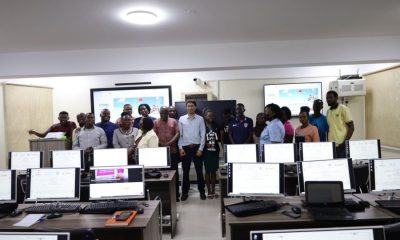
 Computing & IS2 weeks ago
Computing & IS2 weeks agoCoCIS CIPSD Short Courses Jan-Mar 2026
